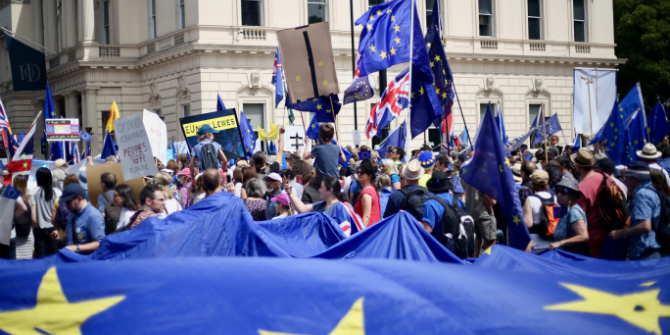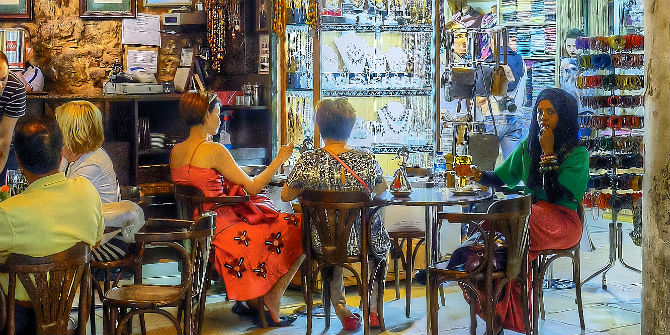 Christian Lequesne is a professor of European politics at the Paris Institute of Political Studies (Sciences Po) and one of the foremost French commentators on UK politics. He spoke to Roch Dunin-Wąsowicz, at the time of the second Article 50 extension granted to the UK, about the EU27’s negotiating objectives, Macron’s stance on Brexit, and France’s vision for the future of the European political project.
Christian Lequesne is a professor of European politics at the Paris Institute of Political Studies (Sciences Po) and one of the foremost French commentators on UK politics. He spoke to Roch Dunin-Wąsowicz, at the time of the second Article 50 extension granted to the UK, about the EU27’s negotiating objectives, Macron’s stance on Brexit, and France’s vision for the future of the European political project.
What are the objectives of the EU27 at this juncture of the Brexit negotiations? Have they at all changed since the completion of the Withdrawal Agreement? What was the primary reasoning behind granting the UK yet another extension?
The 27 member states have to respect the democratic decision of the British people to leave the EU. It is perfectly legal according to the treaties. But the 27 also have to consider two major developments: the British do not know how to leave and the integrity of the EU single market has to be protected. The second issue is a constraint for all member states, from south to north, east to west. A huge mistake of the British government at the beginning of the negotiation was to think that the 27 could possibly accept a single market à la carte. No way! Such a scenario would be too risky for the economies of all member states. This explains why the issue of the Irish border has been the most sensitive one in the negotiations between the UK and the EU. The new extension decided on 10 April is the last chance the 27 are giving to Theresa May to find an agreement at home. There is still some hope among the 27 that the Conservative government and the Labour opposition could reach an agreement. Another explanation for the latest extension is that no member state (even France which seemed tough) wanted to be accused of being responsible of a no deal scenario in the context of the forthcoming European elections.
There have been a lot of comparisons between De Gaulle and Macron in their approach to the UK’s position in Europe. Are these at all warranted? Has the UK been an impediment to a French Europe?
No doubt that Emmanuel Macron has, like De Gaulle, a “certain idea” of what France should do in the world and in Europe. A big difference between them is that Macron is convinced that a new kind of European sovereignty is necessary to manage public policies like fiscal, migration, and defence. De Gaulle could not have imagined sovereignty beyond the nation state. Macron has an bold agenda for the future of Europe. He wants a reform of the Eurozone, he is pursuing a stronger European defence policy, and wants to achieve a more symmetrical trade relationship between France and China. For Macron, Brexit is a “pain in the neck”, which blocks the EU agenda and prevents moving forward. Macron has however two problems with EU reform which are quite substantial. Firstly, it is contested in France where Euroscepticism forces are prominent. Secondly, Macron has weak support from other leaders of Europe. Germans. in particular. are very conservative when it comes to European reform. They want a consolidation of the “acquis”, but nothing more. A “French Europe” is what hard Brexiters and tabloids are worried about. But I am afraid that it is merely a fantasy. On the economy, which prevails in the definition of EU leadership, Germany is much stronger than France. To move forward, the EU will need again a strong Franco-German tandem, which does not function at the moment.
What is France’s vision for a post-Brexit EU? What are the competing visions for European integration, if and when the UK leaves the union? Which is most likely to prevail?
From a rational point of view, there is no other alternative for the French than working close with the Germans. Macron knows that well but has probably underestimated the change with regard to Europe in the German domestic scene. No real answers had arrived from Berlin after Macron’s speech at the Sorbonne. The Germans are reluctant to move forward on the reform of the EMU, although Mrs Merkel accepted the principle of a budget for the Eurozone in the future. The current CDU/CSU is very different from the period of Helmut Kohl. The party speaks more the language of national interest. On EMU, Germany has strong allies in the North (the so called Hanseatic League) which do not want to rush EU reform. The main challenge France has, in the post Brexit period, is how to define a new agenda with Germany. Much depends of electoral politics on both sides of the Rhine, and on Macron’s capacity to continue economic reforms. This task is very tricky for Macron. When you reform the economy, and the state administration, you have the people protesting in the streets who have the real veto power in France. The “Yellow Vests” make Macron’s strategy on Europe much more difficult. No leader can any longer go against domestic public opinion whiter defining their EU policy. The time of permissive consensus on Europe is over.

Do you think the UK will leave the EU before the current deadline on Halloween? Do you foresee any developments on the continent (including the European Parliament elections) that could prevent this from happening?
The date of exit is really dependent on UK domestic politics. Several scenarios are possible: acceptance of the deal, new elections, new negotiations. There is nothing much the 27 could really do, expect encouraging again and again the British government and opposition to come up with a compromise. One thing is sure: there will be no new extensions after Halloween. If Theresa May (or her successor) does not find a compromise in London before October 31, a no deal Brexit will take place. During the European elections, which have also to take place in the UK, Brexit will be used as an argument by both pro EU and anti EU parties, of course. But continental Eurosceptics will have to be very cautious in how they do it. Brexit has been so difficult that it is no longer a convincing model to emulate, it is not endorsed by their electorates. However, European elections will not prevent Brexit from happening.
This article gives the views of the author, not the position of LSE Brexit or the London School of Economics. Image by Robert Davis from Pixabay
Christian Lequesne is Professor of Political Science, Sciences Po, Paris and former Sciences-Po LSE Alliance Professor (2006-2008).
Dr Roch Dunin-Wąsowicz is a sociologist. He is Managing Editor of LSE Brexit and Research Officer at the Visions of Europe project at the Conflict and Civil Society Research Unit, LSE Department of International Development.






